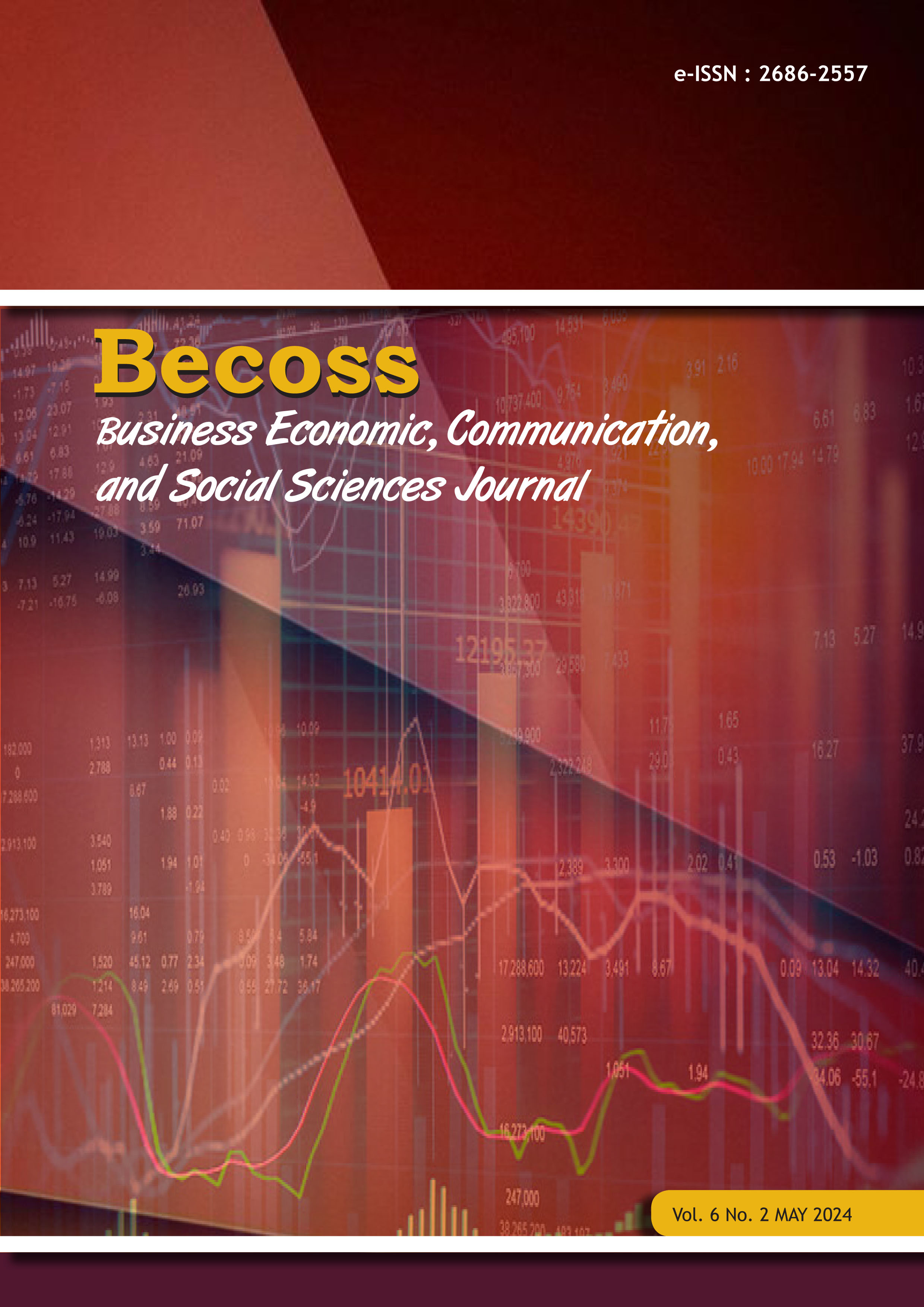Optimizing SMEs Through Digital Design for Sustainable Industrial Development
DOI:
https://doi.org/10.21512/becossjournal.v6i2.11690Keywords:
Design, Digital, Enterprises, Sustainability, SMEAbstract
SMEs (Small and Medium Enterprises) are the pillars of Indonesia's economy, as evidenced by their significant contribution to the country's gross domestic product. The digital disruption era, particularly during the pandemic, has necessitated changes in product development and marketing strategies for SMEs, pushing them towards digital approaches. This research aims to study the application of digital design in branding and digital marketing strategies by SMEs, providing recommendations based on the ADDIE model (Analysis, Design, Development, Implementation, Evaluation). The qualitative research method utilized data from two product samples: Maicih (Food) and Compass (Fashion). In the case of Maicih, engagement was built through a viral snack brand known for its unique spicy flavors, enjoyed socially. The brand's social media, featuring the tagline "cerita emak" (mother's stories), helped foster interaction and drive traffic to online marketplaces. For Compass, the focus was on building a sneaker community, facilitating buying and selling within the community, and fostering emotional connections through collaborations. This study encompasses market analysis, brand design, and the digital development and implementation process. SMEs that can adapt and sustain themselves can address the sustainability goal: "Build resilient infrastructure, promote inclusive and sustainable industrialization, and foster innovation.â€
References
Agustin, A., Putra, G. P. E., Pramesti, D. T., & Madiistriyatno, H. (2023). Strategi UMKM Dalam Menghadapi Digitalisasi. Oikos-Nomos: JURNAL KAJIAN EKONOMI DAN BISNIS, 16.
Ainun, N., Maming, R., & Wahida, A. (2023). PENTINGNYA PERAN LOGO DALAM MEMBANGUN BRANDING PADA UMKM. Jesya, 6(1). https://doi.org/10.36778/jesya.v6i1.967
Alghiffari, I. M., & Listyorini, S. (2022). THE EFFECT OF INFLUENCER AND CONSUMER REVIEW ON PURCHASE INTENTION WITH BRAND IMAGE AS INTERVENING VARIABLE. Jurnal Pemikiran Dan Penelitian Administrasi Bisnis Dan Kewirausahaan , 7(3).
Arianto, B. (2021). Pengembangan UMKM Digital di Masa Pandemi Covid-19. ATRABIS: Jurnal Administrasi Bisnis (e-Journal), 6(2), 233–247. https://doi.org/10.38204/atrabis.v6i2.512
COMPASS. (2024). COMPASS - Footwear Sneaker. https://sepatucompass.com/
Creswell, J. W., & Creswell, J. D. (2018). Research Design: Qualitative, Quantitative, and Mixed Methods Approaches - John W. Creswell, J. David Creswell - Google Books. In SAGE Publications, Inc.
Faremo, G. (2015). Build resilient infrastructure, promote inclusive and sustainable industrialization and foster innovation. UN Chronicle, 51(4). https://doi.org/10.18356/9e86470d-en
Idah, Y. M., & Pinilih, M. (2020). Strategi Pengembangan Digitalisasi UMKM. Prosiding Seminar Nasional Dan Call for Papers “Pengembangan Sumber Daya Pedesaan Dan Kearifan Lokal Berkelanjutan IX,” 9(1), 195–204.
Johnson, E. A. J. (2012). Business Model Generation: A Handbook for Visionaries, Game Changers, and Challengers - By Alexander Osterwalder and Yves Pigneur. Journal of Product Innovation Management, 29(6).
KADIN INDONESIA. (2023). UMKM Indonesia. https://kadin.id/data-dan-statistik/umkm-indonesia
Lamazi, L., Simangunsong, R., Aulia, R., Paramita Hapsari, P., Hakim, A., Soeaidy, S., & Halim, A. (2020). Pengaruh Pertumbuhan Usaha Kecil Menengah (UKM) terhadap Pertumbuhan Ekonomi Daerah (Studi di Pemerintah Kota Batu). Jurnal Ilmiah Ekonomi Pembangunan, 1(2). https://doi.org/10.33395/juripol.v3i1.10491
Maicih. (2024). Maicih Kripik Pedas Bandung. https://www.maicih.com/
Pramaisshella, C. A., & Fisabilillah, L. W. P. (2023). Pengaruh Fintech Peer to Peer Lending terhadap Produk Domestik Bruto Indonesia. Independent: Journal of Economics, 2(2). https://doi.org/10.26740/independent.v2i2.50969
Raphael, A. J., & Rusdi, F. (2022). Pengaruh Strategi Komunikasi Sepatu Compass di Masa Pandemi Covid-19 terhadap Minat Beli Masyarakat. Kiwari, 1(3). https://doi.org/10.24912/ki.v1i3.15792
Riyantoro, B., & Harmoni, A. (2013). Efektivitas Iklan Melalui Jejaring Sosial Sebagai Salah Satu Strategi Pemasaran Keripik Pedas Maicih. Proceeding PESAT (Psikologi, Ekonomi, Sastra, Arsitektur & Teknik Sipil), 5(10).
Sarfiah, S. N., Atmaja, H. E., & Verawati, D. M. (2019). UMKM Sebagai Pilar Membangun Ekonomi Bangsa. Jurnal REP (Riset Ekonomi Pembangunan), 4(2).
Spatioti, A. G., Kazanidis, I., & Pange, J. (2022). A Comparative Study of the ADDIE Instructional Design Model in Distance Education. In Information (Switzerland) (Vol. 13, Issue 9). MDPI. https://doi.org/10.3390/info13090402
United Nations. (2023). The Sustainable Development Goals Report 2023 Special Edition. In The Sustainable Development Goals Report.
Widnyani, N. M., Astitiani, N. L. P. S., & Putri, B. C. L. (2021). PENERAPAN TRANSFORMASI DIGITAL PADA UKM SELAMA PANDEMI COVID-19 DI KOTA DENPASAR. Jurnal Ilmiah Manajemen Dan Bisnis, 6(1). https://doi.org/10.38043/jimb.v6i1.3093
Zaoui, F., & Souissi, N. (2020). Roadmap for digital transformation: A literature review. Procedia Computer Science, 175. https://doi.org/10.1016/j.procs.2020.07.090
Downloads
Published
How to Cite
Issue
Section
License
Copyright (c) 2024 Business Economic, Communication, and Social Sciences Journal (BECOSS)

This work is licensed under a Creative Commons Attribution-ShareAlike 4.0 International License.
Authors who publish with this journal agree to the following terms:
- Authors retain copyright and grant the journal right of first publication with the work simultaneously licensed under a Creative Commons Attribution License - Share Alike that allows others to share the work with an acknowledgment of the work's authorship and initial publication in this journal.
- Authors are able to enter into separate, additional contractual arrangements for the non-exclusive distribution of the journal's published version of the work (e.g., post it to an institutional repository or publish it in a book), with an acknowledgment of its initial publication in this journal.
- Authors are permitted and encouraged to post their work online (e.g., in institutional repositories or on their website) prior to and during the submission process, as it can lead to productive exchanges, as well as earlier and greater citation of published work.
USER RIGHTS
All articles published Open Access will be immediately and permanently free for everyone to read and download. We are continuously working with our author communities to select the best choice of license options, currently being defined for this journal as follows: Creative Commons Attribution-Share Alike (CC BY-SA)






